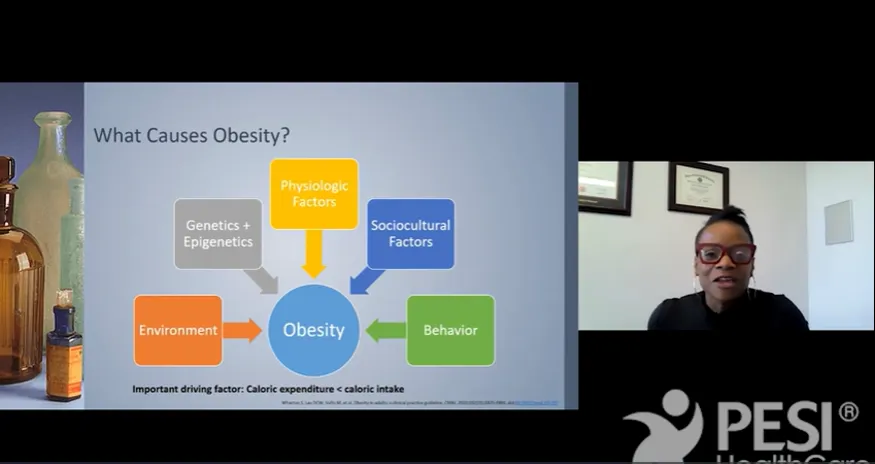Understanding GLP-1 RAs for Short and Long-Term Pharmacotherapy Treatment: A Comprehensive Guide

Obesity is a complex and multifaceted condition that affects individuals across all age groups, races, and socioeconomic backgrounds, with far-reaching consequences for their health and well-being. It is a prevalent global health issue affecting approximately half the world’s population. A shared mission among healthcare professionals is to equip themselves with the knowledge and skills to address this critical issue effectively.
The pharmacotherapy management of obesity is not just about prescribing medications; it is about transforming lives, improving patient outcomes, and helping individuals regain control over their health and quality of life. Currently, the Federal Drug Administration (FDA) has approved nine anti-obesity medications (AOMs) for the short and long-term treatment of obesity and GLP-1 receptor agonists (GLP-1 RAs) have emerged as a significant advancement in the treatment weight management. These medications mimic the action of GLP-1, an incretin hormone that plays a crucial role in regulating blood sugar levels and appetite.
GLP-1 RAs such as Ozempic (semaglutide) have demonstrated efficacy in improving glycemic control by stimulating insulin secretion and inhibiting glucagon release in a glucose-dependent manner. This dual action helps to lower blood sugar levels without risking hypoglycemia, a common concern in diabetes treatment. Additionally, GLP-1 RAs have been found to promote weight loss by delaying gastric emptying and inducing satiety, making them beneficial for patients struggling with obesity alongside diabetes management (Harvard Health).
Despite their benefits, GLP-1 RAs are associated with certain side effects. Commonly reported adverse effects include nausea, vomiting, and diarrhea, especially during the initial weeks of treatment. Patients may also experience rare but serious complications such as pancreatitis, which necessitates careful monitoring during therapy.
GLP-1 RAs are increasingly integrated into comprehensive obesity treatment programs. These programs, as outlined by UT Southwestern Medical Center, combine medication with lifestyle modifications to achieve sustainable weight loss and improve overall health outcomes (UT Southwestern MedBlog).
GLP-1 receptor agonists represent a pivotal advancement in diabetes and obesity management, offering effective glycemic control, weight loss benefits, and potential additional therapeutic advantages. However, healthcare providers and patients alike must remain vigilant regarding side effects, regulatory considerations, and ongoing research to optimize treatment outcomes and patient safety.
In the video below, Pamela Moye, PharmD, BCPS, will breakdown the various facets of obesity management, from understanding the root causes and the epidemiological context to exploring the latest pharmacological interventions. This engaging session will also provide you with insights into practical approaches to develop patient-centered treatment plans, empower patients with the knowledge they need to make informed decisions about their health and promote long-term adherence. There will be an exploration of case studies that challenge decision-making skills and enrich clinical expertise... AND you’ll earn 2 HOURS OF FREE CE!
Get instant access and watch today!
The pharmacotherapy management of obesity is not just about prescribing medications; it is about transforming lives, improving patient outcomes, and helping individuals regain control over their health and quality of life. Currently, the Federal Drug Administration (FDA) has approved nine anti-obesity medications (AOMs) for the short and long-term treatment of obesity and GLP-1 receptor agonists (GLP-1 RAs) have emerged as a significant advancement in the treatment weight management. These medications mimic the action of GLP-1, an incretin hormone that plays a crucial role in regulating blood sugar levels and appetite.
GLP-1 RAs such as Ozempic (semaglutide) have demonstrated efficacy in improving glycemic control by stimulating insulin secretion and inhibiting glucagon release in a glucose-dependent manner. This dual action helps to lower blood sugar levels without risking hypoglycemia, a common concern in diabetes treatment. Additionally, GLP-1 RAs have been found to promote weight loss by delaying gastric emptying and inducing satiety, making them beneficial for patients struggling with obesity alongside diabetes management (Harvard Health).
Despite their benefits, GLP-1 RAs are associated with certain side effects. Commonly reported adverse effects include nausea, vomiting, and diarrhea, especially during the initial weeks of treatment. Patients may also experience rare but serious complications such as pancreatitis, which necessitates careful monitoring during therapy.
GLP-1 RAs are increasingly integrated into comprehensive obesity treatment programs. These programs, as outlined by UT Southwestern Medical Center, combine medication with lifestyle modifications to achieve sustainable weight loss and improve overall health outcomes (UT Southwestern MedBlog).
GLP-1 receptor agonists represent a pivotal advancement in diabetes and obesity management, offering effective glycemic control, weight loss benefits, and potential additional therapeutic advantages. However, healthcare providers and patients alike must remain vigilant regarding side effects, regulatory considerations, and ongoing research to optimize treatment outcomes and patient safety.
In the video below, Pamela Moye, PharmD, BCPS, will breakdown the various facets of obesity management, from understanding the root causes and the epidemiological context to exploring the latest pharmacological interventions. This engaging session will also provide you with insights into practical approaches to develop patient-centered treatment plans, empower patients with the knowledge they need to make informed decisions about their health and promote long-term adherence. There will be an exploration of case studies that challenge decision-making skills and enrich clinical expertise... AND you’ll earn 2 HOURS OF FREE CE!
Get instant access and watch today!
Online Course:
Advanced Clinical Pharmacology Course for Prescribers
Advanced Clinical Pharmacology Course for Prescribers

Earn up to 39.5 CE hours! Includes up to 35.0 total pharmacology CE hours and the 8-hour license renewal requirement by the Drug Enforcement Administration pertinent to the Medication Access and Training Expansion Act. Access the very latest clinical pharmacotherapy updates to treat: COPD, Addiction, Diabetes, ADHD, Obesity, Kidney Failure, Migraines, UTI, Asthma & more! Advance your prescriptive insights as you learn from 18 medication experts (MDs, PharmDs, APRNs) and feel inspired as you watch social media sensation ZDoggMDs important message!






